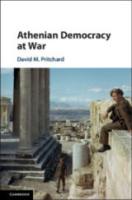
CUP (2019) h/b 312pp £75.00 (ISBN 9781108422918)
War, as P. demonstrates throughout this excellent book, was not only one of the core activities of Athenian democracy from the late 5th-3rd C BC, it accounted for a greater annual financial outlay than religious festivals and politics combined. The Cleisthenic Reforms of 508/7, the Persian Wars of 490–79 and the subsequent formation of the Delian League brought momentous change to Athenian (and as a result wider Greek) warfare, transforming conflicts from a series of infrequent small-scale hoplite encounters to the sustained campaigns involving hundreds of ships and thousands of soldiers that characterized the Peloponnesian and subsequent wars.
Addressing each arm of the Athenian military—hoplite infantry, archers, cavalry (including mounted archers) and the fleet—P. pulls together evidence for their conscription (or enlistment), mobilization and organization while on operations, bringing into clear focus issues such as chains of command and record keeping. Always the social implications of Athens’ war-machine are central: P. convincingly rejects traditional views that Solon’s social class system dictated who served in which branch of the armed forces; with close reference to Old Comedy and forensic oratory, he shows how sailors (Aristophanes’ ‘saviours of the polis’) were esteemed as highly as hoplites; and he explores the democratization of aretê (manly courage) and kudos (reputation resulting from divine aid), originally values associated with aristocratic heroes or athletes, but now associated with anyone prepared to fight bravely.
Funded regularly by imperial tribute and liturgies imposed upon the wealthy, who were compelled to foot many of the navy’s bills, and occasionally by booty and direct taxation, fifth-century Athens’ militarism was a direct result of its participatory democracy, as citizens—fired by the positive spin that annual epitaphioi logoi (speeches for the war dead) put on campaigning, and weighing public costs and personal risks—saw war as a means of winning communal wealth and glory. To quote P.: ‘By the time Athenian democracy was fully consolidated, polemos [war] had come to dominate their politics and their personal lives. War consumed more money than all other public activities combined and was waged more frequently than ever before. Lower-class citizens valued war more highly than any other secular activity. They believed that they were more courageous than the rest of the Greeks. They saw their motives for waging wars as always just and the history of their state as a series of almost unbroken victories.’
Although it shows occasional signs of lax editing (some sentences are repeated verbatim, sometimes on the same page), and while it inevitably leaves some big questions unanswered (how did stratêgoi become proficient in leadership on both land and sea?), this thought-provoking and vital book (aimed at ‘students and teachers, interested general readers and scholars alike’) is a must for anyone interested not just in classical Greek warfare and politics but in what this can tell us about the relationship between democracies in general and the military.
David Stuttard
